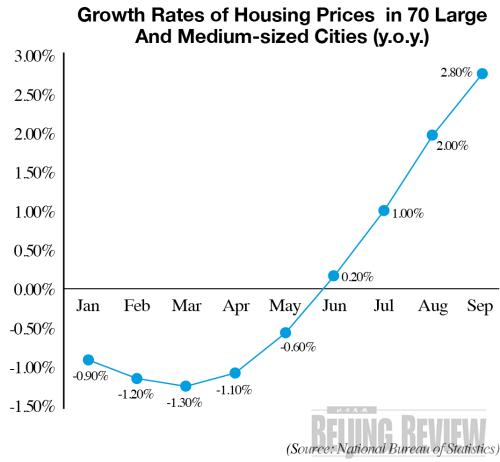| 
Numbers of the Week
2.505 trillion yuan
China's investments in the real estate sector from January to September grew 17.7 percent year on year to 2.505
trillion yuan ($366.5 billion), according to the NBS.
17.6%
Profits of China's state-owned enterprises fell 17.6 percent year on year in the first nine months of 2009 to 936.6 billion yuan ($137 billion), said the Ministry of Finance.
TO THE POINT: The National Bureau of Statistics (NBS) on October 22 released the major economic figures for the third quarter, providing a bullish growth outlook for the Chinese economy. China's milk formula makers overcome consumer fears from the quality crisis last year and draw strength from the broader economic recovery. Though prospects for the stock market remain up in the air, China's fund managers count their blessings on a higher level of corporate earnings visibility. Defying the looming downturn, China's aviation industry turns loss into profit. Telecom operators reel from dim profitability as they pay the price for a 3G spending spree while attempting to implement rural strategies.
By HU YUE
Major Q3 Economic Figures
GDP
China's gross domestic product (GDP) grew 7.7 percent year on year in the first three quarters of this year, said the NBS. The GDP in the third quarter grew 8.9 percent year on year, 1 percentage point higher than in the second quarter.
CPI and PPI
The consumer price index (CPI), a barometer of inflation, dipped 1.1 percent year on year in the first three quarters of 2009.
The producer price index (PPI), a gauge of inflation on the wholesale level, dropped 6.5 percent in the first nine months of 2009.
Exports and imports
China's foreign trade from January to September decreased 20.9 percent year on year to $1.5578 trillion. Exports dropped 21.3 percent to $846.6 billion, and imports totaled $711.2 billion, down 20.4 percent.
Investments in fixed-assets
Investments in fixed-assets from January to September rose by 33.4 percent, 6.4 percentage points higher than last year.
Loans
The newly-added renminbi-denominated loans in the first nine months of this year totaled 8.67 trillion yuan ($1.27 trillion), 5.19 trillion yuan ($759.3 billion) more than that of the same period last year, according to the People's Bank of China, the central bank.
Residents' income
The per-capita disposable income of urban residents in this year's first three quarters averaged 12,973 yuan ($1,898), representing an increase of 9.3 percent year on year.
Industrial output
The industrial output increased 12.4 percent in the third quarter from a year earlier, said the NBS.
Retail sales
Retail sales in the third quarter of 2009 rose 15.1 percent year on year, or 17.0 percent after deducting price factors.
Making Milk Money
For worried Chinese dairy producers, the financial downturn seems to be fading as quickly as it had arrived. One year after the devastating melamine-tainted formula scandal, some major players are finding their way to greener pastures.
In the first half of this year, the four largest Chinese dairy makers—Yili, Mengniu, Bright and Sanyuan raked in a combined profit of around 1 billion yuan ($146.3 million), reporting a strong rebound of 16.6 percent from one year earlier.
The recovery was unexpected, especially after last year's health scare resulted in frightened Chinese consumers flocking to buy foreign formula, even though they were more expensive. On top of the reputation crisis came the broader economic slowdown. The above-mentioned companies, with the exception of Sanyuan, all saw milk sales sour last year.
The panic among consumers eventually lost ground to resurging confidence, and dairy makers put vigorous efforts into branding and enjoyed lower costs as the downturn depressed commodity prices. To alleviate fears, regulators stepped up stringent food safety controls. Meanwhile, the financially-distressed foreign brands dragged in their efforts to tap into the Chinese market, leaving breathing room for their beleaguered local rivals.
The swiftness and magnitude of the bounce-back is cheerful, but reasons to be cautious still exist, said Chen Yu, a senior analyst with the Beijing Orient Agribusiness Consultant, Ltd.
| 